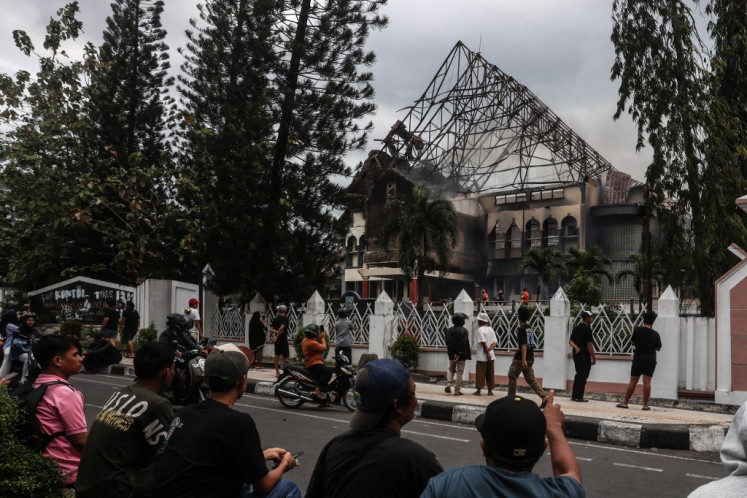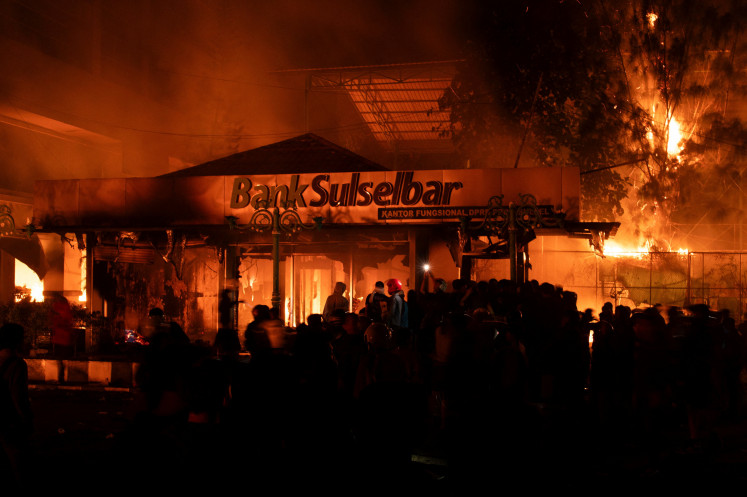Popular Reads
Top Results
Can't find what you're looking for?
View all search resultsPopular Reads
Top Results
Can't find what you're looking for?
View all search resultsEgypt's failure of democratic transition
In the midst of the controversy around the death sentence handed down to the ousted Egyptian president, Mohammed Morsi, the verdict might reveal more about how a democratic transition should look
Change text size
Gift Premium Articles
to Anyone
I
n the midst of the controversy around the death sentence handed down to the ousted Egyptian president, Mohammed Morsi, the verdict might reveal more about how a democratic transition should look.
When the world was expressing jubilation after the popular movement succeeded in toppling then president Hosni Mubarak in 2011, the hope for democracy in Egypt was vivid. Some pundits even expected Egypt to be a 'good model' of democratic transition in the region.
Yet in a surprisingly short time, the democratically elected President Morsi was overthrown by the military in July 2013. He was deemed to have failed in getting a broad coalition established during the critical period of transition.
Morsi and his Freedom and Justice Party (FJP) had been suspected of utilizing their political power to impose their Islamic-leaning agenda. Also, Morsi was considered inequitable as he tried to maintain power over all the courts and named himself the 'guardian' of Egypt's revolution.
Such deceitful tendencies provoked the re-involvement of the military in government. The country, once again, fell back on a long-standing, military-backed regime.
There is certainly no text book about how to guide a transition. However, the chance for a transition to succeed could be greater if the proportions of 'old' and 'new' elites merged into the new system were balanced.
The rationale behind this idea is that political elites always act upon securing their own interests, particularly when they find themselves amid insecurity. They may want to reorganize themselves and form a strong coalition to lock up their interests.
In the Egyptian revolution, the old elite's interests were represented by the military. Knowing the likelihood it would be removed from power, the military and its loyalists would rationally undertake any possible means to fortify their power.
And thanks to Mubarak's prolonged legacy of fostering an ambivalent society, great numbers of Egyptians did not genuinely set them apart from the military.
Although many Egyptians wanted to remove this military government, they were also cautious about the chance of getting a supposedly worse alternative: the Muslim Brotherhood.
The problem came when Morsi seemed reluctant to form a cross-faction government. After a triumph in elections, Morsi and the Brotherhood's party understated the need to compromise with political opposition groups.
This was unfortunate as Morsi only narrowly won the 2012 presidential elections (with 51.73 percent compared with former prime minister Ahmed Syafik's 48.27 percent).
The result showed that despite the profound magnitude of popular protest to oust Mubarak, when it comes to elections the attitudes of voters were somewhat bifurcate ' a great number of people still voted for the old regime.
In short, before the initial transition, the potential sources of social discontent in Egypt were obvious.
Thus the idea of merging the old and new elites within the new system is relevant. Indonesia's experience can tell a story.
Indonesian political transition embraced what the scholars Guillermo O'Donnell and Philippe C. Schmitter called a 'soft-liner' approach back in 1986. At the onset, this idea does not seem to bring change whatsoever because it initially displays a tendency to be accommodating toward political differences.
People may become very frustrated when they find out the old oligarchs have been invited into the new political system. They simply want to have a new system that is not tainted with the bad influences of the past.
But the Indonesian political context forced the country to take this soft-liner approach.
The old oligarchs were not only merged, but also retained important positions in government jobs ' and continued to enjoy their great fortunes.
In many ways, the involvement of those from the old regime has thwarted many efforts to reform Indonesian politics and economics: bureaucracy remains corrupt, the rule-of-law is weakly enforced, economic performance has been modest and so on.
However, this accommodating approach saved Indonesia from the severe political deadlock of the early periods of transition.
If Indonesia opted to take a 'hard-liner' approach as Egypt did, the fate of Indonesian democracy could be different.
Another significant distinction: Indonesians were fortunate to have a reform-minded president BJ Habibie when the transition took place in 1998. Shortly after assuming office, he made significant changes by ending restrictions on political parties, eliminating censorship of the media and proposing political laws to be used to regulate elections in 1999.
He also voluntarily withdrew from the presidential race after the People's Consultative Assembly rejected his accountability report ' such a rare story when one holds full power in their hand.
The story is utterly the opposite in Egypt: a reformed leader able to undertake moderate steps during the transition was absent. The result: political disunity was too harsh to be reconciled within the new system.
_____________________________________
The writer is a Fulbright scholar in political science at Ohio University, the US.










